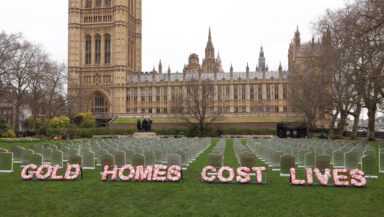This article was lightly updated on 27 May 2020 to reflect the impact of coronavirus and the associated oil price crash.
Update: Bernard Looney’s speech about BP’s net zero carbon ambition left the urgent questions unanswered. The handful of answers he did provide showed BP isn’t serious about tackling climate breakdown.
When you cut away the fat, here’s what’s left: Bernard Looney isn’t going to stop BP drilling for new oil and gas.
Reinventing BP – as the speech was titled – means a little bit less oil and gas, and a little bit more renewable energy. But the core business won’t change. “BP is going to be in the oil and gas business for a very long time,” he said. “That’s a fact.”
Does this meet the needs of the climate? Absolutely not.
BP has a problem. On the one hand, it wants to be seen as a responsible company, one that is taking the climate emergency with the seriousness it deserves. On the other, it still makes huge profits from digging up the very fossil fuels that caused the emergency in the first place.
Fortunately, BP has a solution. A change at the top will help reshape the company for this new, hotter world. Out goes the hard-nosed oil men of old, in comes someone more in tune with the sensibilities of our modern times. Someone who can deliver BP’s charm offensive to persuade the world that it’s serious about the climate crisis.
Bernard Looney is that person. Or is he? He says he understands the frustrations of people who feel BP is not moving quickly enough to cut its share of global emissions, and “shares their deep concern”. People like the Greenpeace activists who shut down BP’s head office in London on his first day in the job. But Looney was head of oil drilling at BP for years, and beneath the shiny green veneer lies someone who plans to keep drilling for oil for years to come.
BP’s net-zero carbon ambition needs to be: stop drilling oil
Looney will reveal just how much he gets it, as he delivers his maiden speech as BP CEO. He will lay out his vision of how the company will respond to the climate crisis.
In truth, Looney only needs to say one thing. That BP will stop drilling for new oil and gas, right now.
Prior to the onset of COVID-19 measures and the oil price crash, BP was projected to invest $71 billion over the next decade in finding new oil and gas. But this can’t be burnt if there’s to be any chance of keeping temperature increases below 1.5ºC. There’s a global agreement to meet this target and avoid climate breakdown, but it’s in jeopardy until BP decides to stop digging up more fossil fuels.
And Looney needs to go further. To stick to the 1.5ºC target, production from existing oil and gas fields needs to be cut – 9% for oil and 6% for gas. In other words, the oil and gas already discovered needs to be left in the ground. So not only is there no space for any new oil or gas, Looney needs to announce that BP will leave some of the oil and gas in its existing fields untouched.
BP’s plan will rely on net-zero carbon tricks
In reality, Looney’s speech won’t say anything like this. Instead, he will say that BP will become net zero carbon by 2050. At face value, this sounds great. But it’s a smokescreen, designed to draw attention from the fact that BP has no intention of ramping down the oil and gas investments.
Net zero carbon is an accounting trick, based on the idea that someone else will clean up any carbon emissions BP is responsible for. BP will continue with its $71 billion plan to release even more carbon into the atmosphere, but will ‘offset’ those emissions elsewhere or rely on new technologies that don’t exist.
That’s the theory. In practice, it doesn’t work like that.
Offsetting and carbon capture are false solutions
Offsetting means doing something that will cancel out BP’s emissions. Planting trees to draw down and store carbon is one example – expect Looney to talk a lot about trees. But this approach is fraught with problems.
Trees take a long time to grow. To be effective, BP would need to guarantee these trees would survive for decades. And while planting trees and restoring forests is good, BP would need a mind-boggling number of trees to take care of its emissions. Shell’s CEO has talked of planting “another Brazil in terms of rainforest” to meet the 1.5ºC target.
More trees are definitely needed, and forests need to be restored to tackle the climate crisis. But it’s a terrible idea to let BP pump out carbon emissions now in the hope that someone else will plant trillions of tree later to make up for it.
What about new technologies? Looney will no doubt refer to carbon capture and storage, sucking carbon out of the atmosphere and squirrelling it away. The problem is this technology is unproven and doesn’t exist at the scale BP would need to reach net zero carbon.
And above all, whatever magic tricks Looney relies on, BP will still be pumping out fossil fuels. Once burnt, that carbon will heat the planet further still and the climate crisis will only get escalate. The only solution is to cut those emissions at source, by burning less oil and gas.
BP’s net zero carbon ambition might sound impressive, but means little in practice. The truth lies in where BP puts its money – pumping billions of dollars into new oil and gas shows it’s not serious about climate change.



